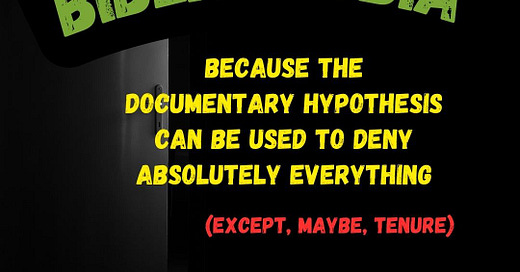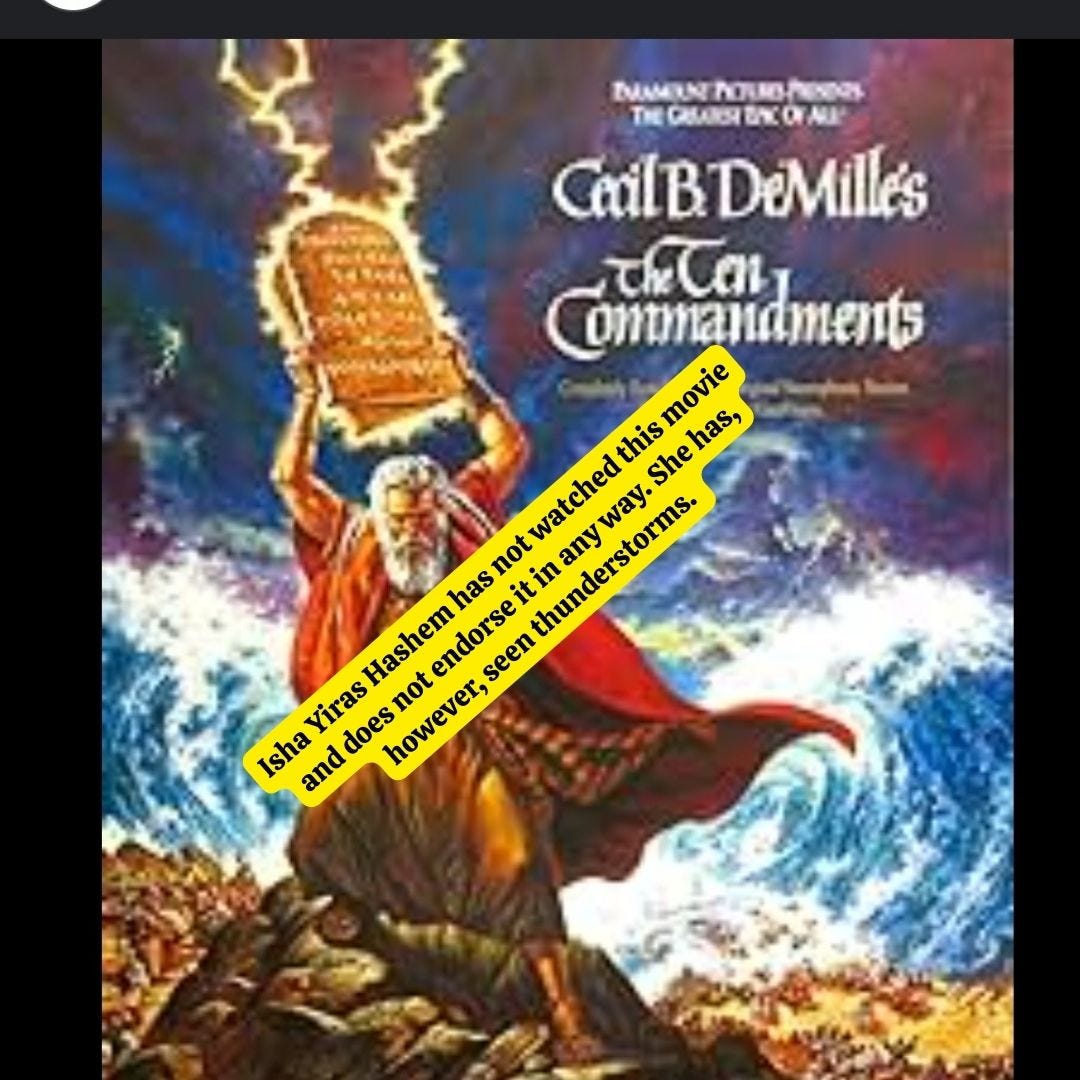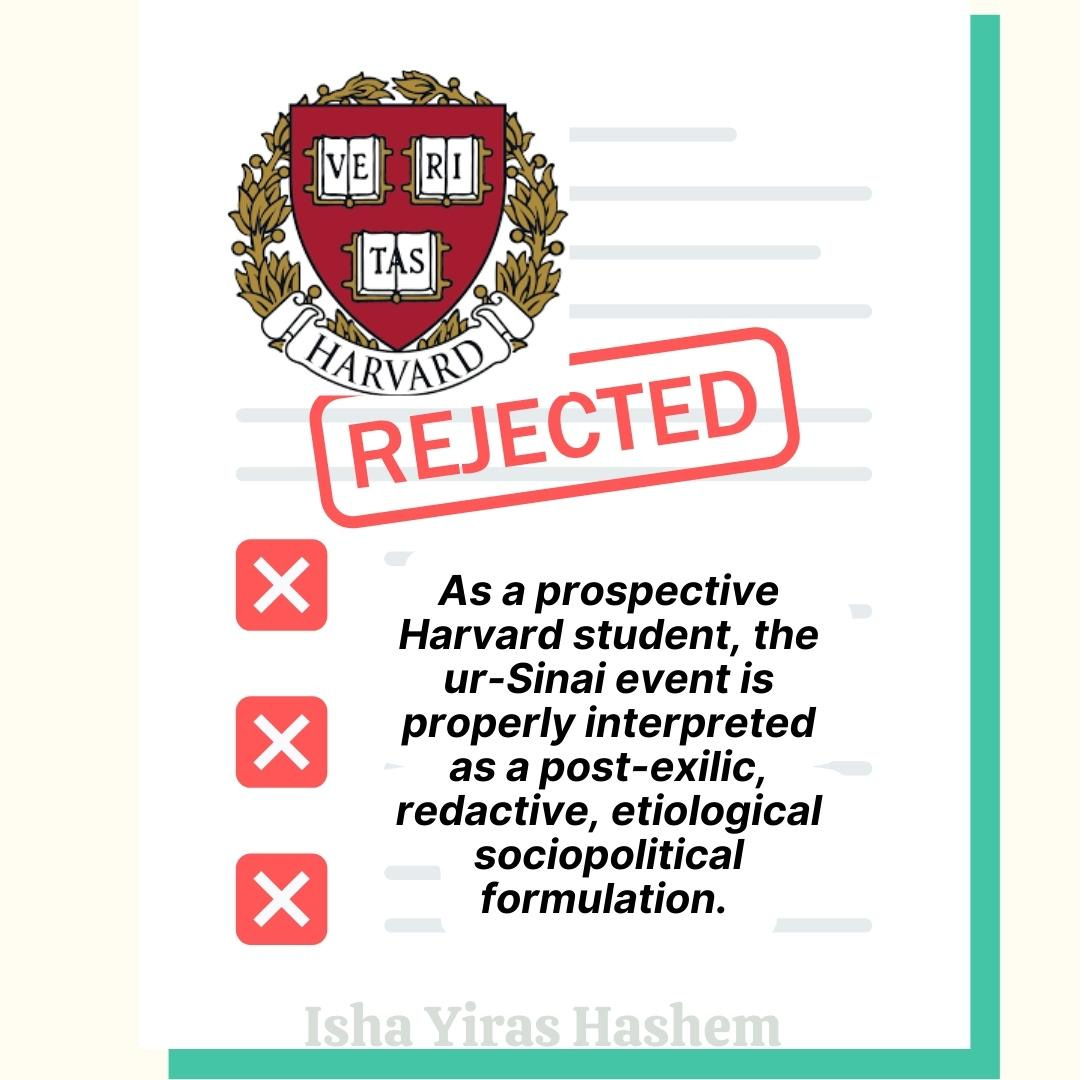Español: Mieda a la Biblia
To our new subscribers—welcome, and thank you! Isha Yiras Hashem at Substack writes universalist spiritual humor from a Jewish perspective, a genre which is allergic to monetization. I do not accept paid subscriptions, and there is no way for you to send me money.
Comments will be deleted if they are racist, contain unexplained links, consist solely of emojis, and/or otherwise inappropriate.
Regarding correspondence at ishayirashashem@gmail.com: I am newly implementing a 3-message limit for anonymous contacts.
Thoughtful communication is always welcome, especially if you hate me personally. Coming from an anti-Semitic or atheist perspective? I’ll do my best to engage respectfully. Low effort spam and attacks? Deleted and blocked.
Prefer to read this blog in another language? Just ask! I’d be glad to translate text and images for even one reader.
7 weeks after the second day of Passover1 is Shavuot, and it celebrates the giving of the Torah. The three major religions agree about the existence of the Patriarch Abraham, known for his hospitality.2 Similarly, Muslims and Christians also believe the Exodus and Decalogue are historical. Building upon this joined foundation, world peace may be possible, but only if you read this post.
Because do you know who doesn't want Jews, Christians, and Muslims to agree on the historicity of Shavuot?
Bibliophobes.3
A bibliophile is someone who loves books. A bibliophobe is someone who hates books. But a Bibliophobe, with a capital B, hates the Book, i.e. The Bible. And Bibliophobes do not discriminate in their bigotry. From Genesis to Ecclesiastes, Bibliophobes believe you shouldn't be foolish enough to take any of it seriously.
If my Substack ate food, it wouldn't eat cheesecake on Shavuot. It would be a Bibliophobevore. It would process Bibliophobes; people like Professor Israel Finkelstien, who says that “Jews and researchers of all backgrounds call the site the City of David — a name given to the ridge by early European explorers.”4
(Those must have been some pretty early European explorers!)
How about Professor Ze'ev Herzog, a respected archaeologist who teaches at Tel Aviv University.5 He writes in Haaretz:
Thus, the great united monarchy is an imaginary historiosophic creation, which was composed during the period of the Kingdom of Judea at the earliest. Perhaps the most decisive proof of this is the fact that we do not know the name of this kingdom.6
It's really too bad we have no idea of the name of this ancient united Judean kingdom. I mean, what could it possibly be?
Surely, there must be surviving traditions about this kingdom! But of course, not those silly ones from major world religions that are only a few thousand years old. No, no! We can dismiss those as biased folklore and faithfully cling to the Documentary Hypothesis. I mean, who wouldn’t love a phrase like “imaginary historiosophic creation”? It definitely sounds more academic than “made up story”, which is what it means.
You know who can totally play that game? Based on a comprehensive meta-analysis of ancient Near Eastern texts and interpretive frameworks, Isha Yiras Hashem concludes that modern archaeology should be relegated to the category of ‘literary artifact,’ with no referential claims to reality.
But on my blog, I get to speak my truth. So let me be clear: I think that it all happened exactly as described in the book of Exodus. Not a symbol, not a poetic construct, not a myth, but simply an actual historical event, where a real people stood at a real mountain.
The date was 7 Sivan, 2448 years from Creation, although we celebrate it on the 6th. G-d appeared at Sinai with lightning and thunder and the people heard G-d say “I am your G-d, you shall have no other gods before me.”7 And that's how and when they became the Jewish people. It would have made an incredible movie.8
As I mentioned, while the world's three major religions have many conflicts, they all agree this happened. So, in an effort to bring about world peace, I have a tradition of writing about Bible criticism for this holiday. Maybe I will get a Nobel Peace Prize. Have no fear, I am under no illusion that this will earn me any sort of credibility or prestige. Quite the opposite, in fact. I'd never be allowed into rarefied academic circles.
Let us imagine that I was applying to Harvard for a doctorate in their Bible studies department.9 What would I write on the application? Writing is my strong point. Which version is the best?
Version 1: The vulnerable angle
“The traditional holiday of Shavuos drew me to the field of Torah Realism, closely related to Quantum Monotheism and Patriarchal Literalism, which I have been studying since I was able to eat cheesecake. My mind is open to being disproven, so imagine the great story if you convince me!”
Version 2: The apology with apologetics
“According to the Masoretic Jewish tradition, G-d appeared upon Mt. Sinai, and while the precise location is unknown, having mapped it myself, I believe it is near Jebel Musa in the southern Sinai Peninsula. Christians and Muslims also agree the Jews received the Ten Commandments from Moses there, and that is obviously unacceptable. I’m really sorry for believing this.”
They would never accept that apologetic supplication. Weak-willed people don't make history.
Version 3: The diversity angle
“There’s currently no one in all of Harvard who openly believes the Bible is literally true.10 Think of me as your token diverse Biblical literalist candidate.”
If I wasn't an extremely boring Jewish mom in real life, that might actually work.
Version 4: Sophisticated and academic
“The historicity of the Exodus is a contested topic among scholars, and as a prospective doctorate student, I naturally lean toward Wellhausen’s11 proclivity for lengthy explanations, but based on extemporaneous data from the Dead Sea Scrolls, I cannot rule out that it did happen.
As for idolatry, I remain firmly opposed—though, in the spirit of postmodern pluralism, I assure you that it’s only other people’s idols I object to. So please give me a PhD while I continue to celebrate Shavuot.”
If I really want to make them happy, it is probably best to write it in complicated words that won't make sense to anyone the first time they read it. Something like, ‘as a prospective Harvard student, the ur-Sinai event is properly interpreted as a post-exilic, redactive, etiologically sociopolitical formulation.’ See Version 5 below:
Think about it. Even if I were somehow accepted, there’s no way they’d grant me a degree if I insisted on openly and sincerely believing what I was studying. Imagine me standing there, claiming G-d controls history. No PhD would be forthcoming; not even a master’s. It’s a funny world, really. In today’s world, stay-at-home mothers who write blogs may be among the last few people to say exactly what they want to say.12
Have a great Ten Commandments reading!
Technically counted from the second day of Passover, as seen in Leviticus 23:15–21. Read about it here: https://ohr.edu/991
See post on my trip to Barcelona.
Thanks to Rabbi Reinman, who invented the term. He approved my using it.
https://forward.com/opinion/137273/in-the-eye-of-jerusalem-s-archaeological-storm/
Like many others, Prof. Ze'ev Herzog has made a career out of his Bibliophobia.
http://individual.utoronto.ca/mfkolarcik/jesuit/herzog.html
Exodus 19:2: “And Israel camped there in front of the mountain.” Followed by lightning, thunder, and G-d’s voice in Exodus 19:16–19 and 20:1–2.
Like this one!
Harvard doesn't have a Bible Studies department. They don't take it that seriously.
A minor exaggeration for humor, but it's certainly reasonable to note that biblical literalism is rare among those in relevant departments, like Near Eastern studies or archaeology.
Shavuot's biggest enemy is Julius Wellhausen, the 19th-century German scholar who proposed the Documentary Hypothesis, arguing that the Torah is a composite of multiple sources (J, E, P, D), rather than the word of G-d. His work underpins much of biblical criticism to this day. See the third section of this book review for more on this topic.
In my research, I have also read his Prolegomena to the History of Israel (1878). It is incredibly boring. Not recommended.
Ethics of the fathers, 6:2
ואומר: 'והלוחות מעשה אלהים המה והמכתב מכתב אלהים הוא חרות על הלוחות' (שמות ל"ב, ט"ז), אל תקרי חָרוּת אלא חֵרוּת, שאין לך בן חורין אלא מי שעוסק בתלמוד תורה."
And it says: The tablets were the work of God, and the writing was the writing of God, engraved (Hebrew: charut) on the tablets (Exodus 32:16). Do not read charut (engraved), but cheirut (freedom), for no one is free except one who engages in the study of Torah.
Last year:
Shavuot and Biblical Criticism
Last year: Boris the Terrible Dreams About Shavuot, With Biblical Criticism









This was a pleasure to read! Funny enough, in Israeli public school,
We learned one semester of תורה שבעל פה, about Rosh Chodesh. Then the minister of education changed. By high school 10th-12th grades we were learning the Documentary Hypothesis. Until American Kirov programs taught me to read Rashi I had a very different understanding of Shavuot. Definitely still included cheesecake though.
Great post!! Send it to some of our OTD friends. But beware: they’re smarter than us, and they will leave you speechless just because they are smarter than us. Does that make sense?
I would disagree on one point: however they describe the archeology that they discovered does not discount the actual discoveries themselves. When I first came to Israel nearly 40 years ago, I was blown away by archeology. You mean the mikvas on top of Masada are the EXACT SAME MEASUREMENTS as you and I (used to) go to! Is that crazy exciting , or what?